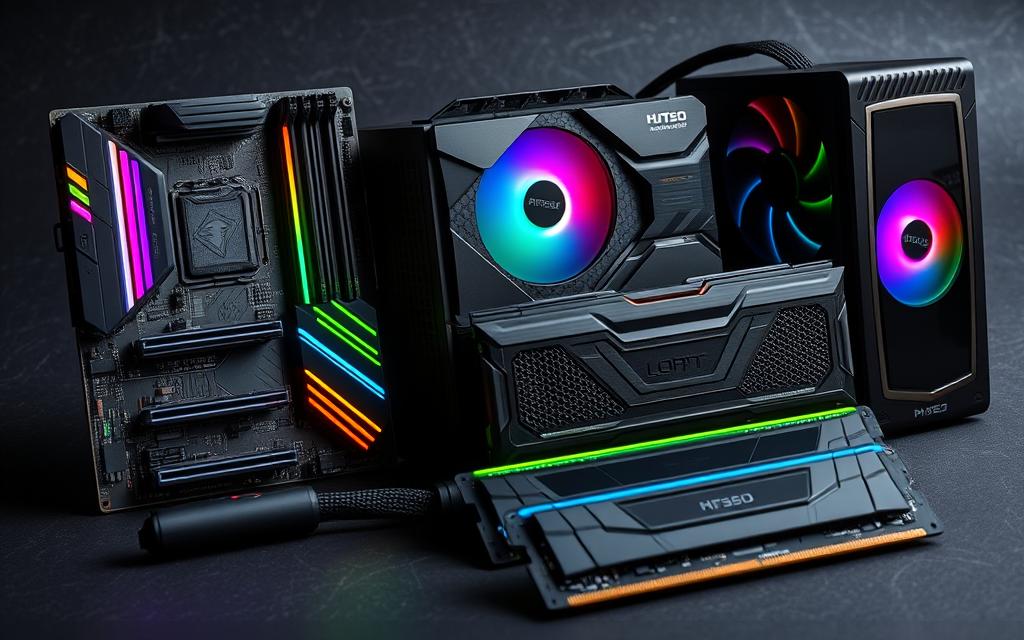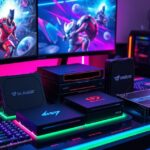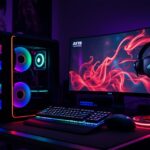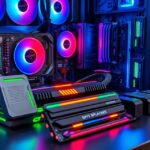Step-by-Step Guide to Set Up Your PC for Gaming
Nowadays, gamers face a big decision: buy a pre-built PC or build one themselves. This guide will show you how to set up a gaming PC your way. You’ll get tips on picking the right parts for a great gaming experience.
When you build your own gaming PC, you can choose parts that match how you play and what you can spend. Make sure your PC can handle your favorite games now and in the future. This makes sure your gaming setup stays up to date.
It’s important to put your PC together carefully to avoid mistakes. Installing RAM is easy but has to be done just right. Adding thermal paste and a good GPU are also crucial steps. Every detail matters.
We’ll help you fine-tune your gaming setup for the best play every time. Enjoy thrilling gaming moments with our guidance.
Understanding the Basics of PC Gaming Setup
PC gaming has grown a lot in popularity. It draws in many fans. Knowing what makes a good gaming setup is key to a great gaming experience. It’s about learning what a gaming PC is and how important the hardware is for gaming power.
What is a Gaming PC?
A gaming PC is a computer built for playing games. It is different from regular computers. Gaming PCs have high-performance parts. These include:
- Powerful processor (CPU) to do complex math quickly.
- Dedicated graphics card (GPU) for clear graphics and smooth videos.
- Abundant RAM to multitask during games without problems.
- High-capacity storage (HDD/SSD) for fast game and file access.
All parts of a gaming PC must work well together for the best performance. Gamers need to choose parts that match well. This improves the gaming fun.
Importance of Hardware in Gaming Performance
Hardware is super important in gaming. The CPU and GPU, especially, affect how games perform. They change how games look and let players do more at once. Good hardware makes gaming more fun and exciting.
If the parts aren’t good, games might lag or look bad. This makes it hard to play new games. Knowing about gaming PC parts helps gamers choose wisely. When investing in gaming, finding the right balance of cost and quality is essential. This ensures a great gaming time without trouble.
Choosing the Right Components for Your Gaming PC
Selecting the right gaming PC components matters a lot for a gaming setup. Every part adds to how well it performs. So, it’s important to know about each component when choosing what fits your gaming PC budget.
Key Components Overview
When building a gaming PC, focus on these must-have hardware parts:
- Motherboard: It’s the core of your system. It must match your CPU and RAM. It comes in different sizes, affecting space and upgrade options.
- CPU: A strong processor is key. Nowadays, they range from 2 to 64 cores. A clock speed of 3.5 to 4.0 GHz is good for current games.
- GPU: This can be your priciest part. Graphics cards vary from $300 to $800. For a good card, plan to spend $200 to $500.
- RAM: 8GB to 16GB fits most games. Make sure it works with your motherboard. DDR3 and DDR4 RAM aren’t the same.
- Storage: Start with at least 512GB. SSDs load games faster than HDDs.
- Power Supply Unit (PSU): Get a PSU with a little extra power, about 50W or 100W more. Look for an efficiency rating like 80+, Gold, or Platinum for stable performance.
- Cooling System: A good cooling system stops your PC from getting too hot, keeping performance up, especially during long gaming times.

Balancing Performance and Cost
Combining performance vs. cost is key for an affordable gaming PC. Start by setting a budget, ideally between $600 and $2,500. This gives you flexibility while ensuring quality.
Picking middle-level parts can lower costs but still offer good performance. For instance, a setup with an Intel Core i3-14100F and an Intel Arc A380 GPU costs about $449. It’s a great deal. Yet, spending a bit more on an Intel Core i5-14400F and Nvidia RTX 4060 for about $784 can boost performance and last longer.
It’s wise to look at trustworthy sites for recommended parts lists for all budgets. This can save money over buying a prebuilt PC, which is usually more expensive.
| Component | Budget Option | Mid-Range Option |
|---|---|---|
| CPU | Intel Core i3-14100F ($89) | Intel Core i5-14400F ($154) |
| GPU | Intel Arc A380 ($109) | Nvidia RTX 4060 ($299) |
| RAM | Silicon Power Value Gaming DDR4 16GB ($25) | Patriot Viper Elite II DDR4-3600 32GB ($55) |
| Storage | Crucial P3 Plus 1TB ($59) | WD Black SN770 1TB ($74) |
| Case | Cooler Master MasterBox Q300L ($39) | Gamdias Aura GC1 ($59) |
| PSU | Thermaltake Smart Series 500W ($39) | Thermaltake Smart 700W ($54) |
How to Set Up PC for Gaming
Starting your gaming PC setup needs careful planning and step-by-step actions. Each part of the process is key to creating a great gaming system. We will guide you from setting up your space to tweaking your software.
Step 1: Preparing Your Workspace
The right space makes building a gaming PC easier. Choose a big, clean spot with plenty of light for putting together your PC parts. Have tools like a Phillips screwdriver and thermal paste close by. Having them along with each part’s guide helps avoid errors that could harm your hardware.
Step 2: Assembling Key Components
Begin assembling by putting the motherboard in the case, then add the CPU and RAM. After that, install the GPU carefully. Follow each part’s manual closely to keep everything stable and avoid problems. It’s also vital to prevent static electricity, which can damage the parts.
Step 3: Installing the Operating System
After putting the hardware together, it’s time for the operating system. Most choose Windows 10 or 11 because they work great for games. You’ll need a bootable USB drive and to adjust BIOS settings to use it. Installing Windows will then be your next move, affecting how well games and apps run.
Step 4: Optimizing Drivers and Software
With the operating system in place, next is software installation and driver updates. Make sure your graphics card drivers are up-to-date for the best gaming. Freequent updates can bump up FPS, with some Nvidia updates boosting performance by almost a quarter. Turning on Game Mode in Windows helps too, by stopping apps you don’t need from slowing things down. Also, tweak your monitor and game settings to get the most out of your games.
Enhancing Your Gaming Experience
To make your PC gaming great, there are a few things you can do. Optimizing settings and updating software helps a lot. Doing this can make your gaming smoother and more fun.
Optimizing PC Settings for Gaming
Start by tweaking your PC settings for gaming. Use Game Mode in Windows to make games run better. It lowers distractions from other programs. Also, change your power settings for better performance.
Remove apps you don’t need to make your PC run better. This can also increase your game’s frame rates.
Updating Drivers for Maximum Performance
It’s important to keep your GPU drivers up to date. This makes sure your games run smoothly. Brands like Nvidia and AMD offer updates for this reason. Tools like Lenovo Vantage make updating easy.
Old drivers can slow your games down. Stay on top of updates to keep your gaming at its best.
Maximizing In-Game Settings
Adjusting your game’s settings can improve how it runs. Lower the graphics details like shadows and textures to up your FPS. Turning off high-demand features also boosts performance.
Try out different settings to see what works best for your PC. This helps you get good quality without losing speed.
| Setting | Recommendation | Impact on FPS |
|---|---|---|
| Shadow Detail | Medium to Low | +10-20 FPS |
| Texture Quality | High | +5-15 FPS |
| Ray Tracing | Off | +15-30 FPS |
| Resolution | Native | Stable FPS |
| Anti-aliasing | Medium | +5 FPS |
| Game Mode | Enabled | Improved Stability |
Playing with these settings lets you customize your gaming. By adjusting and maintaining your system, gaming becomes smoother and more fun.
Conclusion
Building a gaming PC needs careful choice of parts for the best play. A good mix of CPU and GPU boosts your game fun. Plus, putting it together right makes everything work better.
Choosing a custom PC over a ready-made one has many pluses. You get to make it just how you like, from parts to looks. Also, a comfy workspace and great peripherals make gaming better.
Right hardware choices up your game quality and make gaming more fun. To learn more about perfect balance in gaming PCs, see this topic here. Using these tips, you’ll get the most out of your gaming, for both work and play.
FAQ
What should I consider when building a gaming PC?
When building a gaming PC, think about crucial parts like CPU, GPU, RAM, and motherboard. Also consider storage, PSU, and cooling. Choose parts based on your gaming needs and budget.
How can I optimize my gaming PC for better performance?
To boost your PC’s gaming performance, update all drivers first. Turn on Game Mode in Windows settings. Remove apps running in the background. Adjust game settings for better gameplay and visuals. You could also overclock your CPU or GPU for more power.
What is the best operating system for gaming?
Windows 10 and Windows 11 are top choices for gamers. They work well with many games and accessories. Make sure your system is up to date for the best performance.
How do I keep my gaming PC cool?
Keep your PC cool with fans or liquid cooling. Make sure your case has good airflow. Clean your filters and check temperatures to stop overheating.
Is it worth it to build a custom gaming PC instead of purchasing a pre-built one?
Yes, a custom gaming PC offers more customization and better performance. It’s easier to upgrade later compared to pre-built models. This gives you a gaming setup that meets your needs.
What budget should I set for building a gaming PC?
Your gaming PC budget can vary. A good setup might cost 0 to
FAQ
What should I consider when building a gaming PC?
When building a gaming PC, think about crucial parts like CPU, GPU, RAM, and motherboard. Also consider storage, PSU, and cooling. Choose parts based on your gaming needs and budget.
How can I optimize my gaming PC for better performance?
To boost your PC’s gaming performance, update all drivers first. Turn on Game Mode in Windows settings. Remove apps running in the background. Adjust game settings for better gameplay and visuals. You could also overclock your CPU or GPU for more power.
What is the best operating system for gaming?
Windows 10 and Windows 11 are top choices for gamers. They work well with many games and accessories. Make sure your system is up to date for the best performance.
How do I keep my gaming PC cool?
Keep your PC cool with fans or liquid cooling. Make sure your case has good airflow. Clean your filters and check temperatures to stop overheating.
Is it worth it to build a custom gaming PC instead of purchasing a pre-built one?
Yes, a custom gaming PC offers more customization and better performance. It’s easier to upgrade later compared to pre-built models. This gives you a gaming setup that meets your needs.
What budget should I set for building a gaming PC?
Your gaming PC budget can vary. A good setup might cost $800 to $1,200. High-end PCs can go over $2,000. Balance cost with the performance you want.
How often should I update my drivers for gaming?
Regularly check your drivers, especially the GPU’s, for updates. New updates can boost performance, improve game play, and fix issues.
What are the best practices for assembling my gaming PC?
When assembling your gaming PC, start with a clean space. Follow the guides for each part. Ground yourself to avoid static damage. Make sure everything is attached securely. Take your time to do it right.
Can I upgrade my gaming PC later?
Yes! Upgrading is a big advantage of having a gaming PC. Pick a motherboard and power supply that allow for future upgrades. This way, your PC can grow with your gaming needs.
,200. High-end PCs can go over ,000. Balance cost with the performance you want.
How often should I update my drivers for gaming?
Regularly check your drivers, especially the GPU’s, for updates. New updates can boost performance, improve game play, and fix issues.
What are the best practices for assembling my gaming PC?
When assembling your gaming PC, start with a clean space. Follow the guides for each part. Ground yourself to avoid static damage. Make sure everything is attached securely. Take your time to do it right.
Can I upgrade my gaming PC later?
Yes! Upgrading is a big advantage of having a gaming PC. Pick a motherboard and power supply that allow for future upgrades. This way, your PC can grow with your gaming needs.










